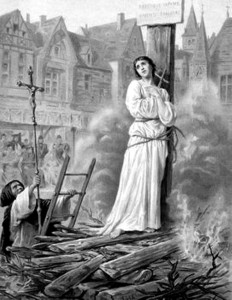A young woman who grew up Christian but had never attended a Reformed or Presbyterian service came with her friends to a church I served. She told me later how upsetting she found the unison prayer of confession:
“We have left undone those things which we ought to have done; and we have done those things which we ought not to have done; and there is nothing good in us.”
While the rest of us took the words for granted, they took her aback. She looked up from the worship bulletin and scanned the congregation, all of whom were praying aloud. “I couldn’t believe all these people were admitting this in front of God and everybody!”
To many of us in a liturgical Christian tradition, the attack from the Christian right on President Obama after his prayer breakfast speech last week left us baffled. Former governor of Virginia Jim Gilmore has written that President Obama’s speech was “the most offensive I’ve ever heard a president make in my lifetime.”
Further, he said that the president “offended every believing Christian in the United States.”
Here are the offending words of the president:
“Humanity has been grappling with these questions throughout human history,” he told the group, speaking of the tension between the compassionate and murderous acts religion can inspire. “And lest we get on our high horse and think this is unique to some other place, remember that during the Crusades and the Inquisition, people committed terrible deeds in the name of Christ. In our home country, slavery and Jim Crow all too often was justified in the name of Christ.” [Quoted from the Washington Post online]
Response from the Christian right ranged from “that was a long time ago,” to “the Crusades were justified,” to SBC president Russell Moore’s “The evil actions that [Obama] mentioned were clearly outside the moral parameters of Christianity itself and were met with overwhelming moral opposition from Christians.” Well, no.
Most of the offense seemed to come from the fiction that President Obama had intimated that Christianity and ISIS are morally equivalent.
While much of the hysteria can be written off as political crazy talk that naturally emerges when reactionaries hear the speech of a Muslim Atheist Kenyan Communist Black Panther Terrorist-sympathizing leader of the free world, some of it comes from a genuine difference between liturgical and non-liturgical Christianity.
Those of us in the Reformed tradition, especially those of us who are faith-descendants of John Calvin (who did not burn Michael Servetus at the stake, that’s a nasty rumor–he just approved of it after the fact) confess our sin each week in response to the words of Scripture,
“If we say that we have no sin, we deceive ourselves, and the truth is not in us. If we confess our sins, he who is faithful and just will forgive us our sins and cleanse us from all unrighteousness. If we say that we have not sinned, we make God a liar, and his word is not in us.”
The universality of sin, especially idolatry, stands at the center of our worldview.
The fact that Christianity has been distorted throughout history (and continues to be distorted to justify murder, kidnapping child soldiers, and discrimination) comes as no surprise to Calvinists. Humans being what we are, we will use every force for good, whether religion or science or psychology as a tool to serve our own ends.
In the Christian tradition that does not include a regular confession of sin, such an examination of our own religion’s history could sound weak and even treasonous. Eric Erickson’s language reveals this profound difference when he writes “When we possess Christ, we possess truth.” In the non-liturgical and fundamentalist Christian tradition, Christ is a tool or even a weapon to be possessed to give us an advantage over others. Rather than a guiding light, Jesus becomes a heavy flashlight to be wielded against opponents.
When one’s own desires stand at the center of faith rather than God’s, whether one’s desire is a ticket to heaven, winning an argument, winning an election, or making more money, that religion becomes self-serving and idolatrous. The words of Jesus and the prophets (“love your neighbor as yourself,” for instance) can get hammered into the oddly-shaped space in the heart of the self-centered pilgrim, but they will not find room to take root and grow.
Self-satisfied Christianity insulates its adherents from those who believe differently. “You seem like a nice person, too bad you’re going to hell unless you believe the same thing I do” tends to put up a wall against authentic and mutual friendship with anyone devoted to a different religious tradition.
For those of us who have Muslim friends, the fact that ISIS and Al-Qaeda are misusing Islam for their own ends is self-evident. Only someone who has no close Muslim friends could believe that Islam is, at its root, more violent than Christianity and that all Muslims are potentially dangerous.
For those emotionally cut off from actual Muslim people, violence in the Koran defines the religion of Islam in a way that violence in the books of Judges and Revelation, for instance, do not define Christianity.
The president’s point, almost lost in the kickboxing match of political competition for the victim badge, seems so obvious. It is, however, no less offensive to us righteous sinners now than when Jesus first said it: “Why do you see the speck in your neighbor’s eye, but do not notice the log in your own eye?”
